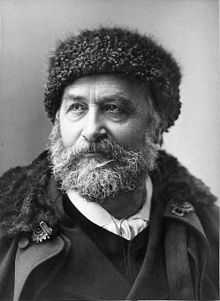Élie Reclus
From Wikipedia, the free encyclopedia

Élie Reclus
Élie Reclus (French: [ʁəkly]; 16 June 1827, Sainte-Foy-la-Grande – 11 February 1904, Brussels) was a French ethnographer who studied what were then called primitive cultures. He served as director of the Bibliotheque National in Paris.
He was the oldest of five brothers, born to a Protestant minister and his wife. His middle three brothers, including the well known anarchist Elisée Reclus, all became geographers.
He is also known for his anarchist writings.
Works
- Many articles in French or foreign journals or magazines, among which:
- Revue de l’Ouest, Bay Saint-Louis (USA) ;
- Mysl, then Dielo, Saint-Petersburg ;
- Rousskoïé Slovo ;
- The Times ;
- Putnam’s Magazine,
- International, San Francisco) ;
- La Gironde (« Lettres d’un cosmopolite ») ;
- La Rive gauche ;
- La Nouvelle Revue,
- Revue de la Société d’anthropologie ;
- La Commune.
- 1864 : Introduction to the Dictionnaire des communes de France, in collaboration with Élisée Reclus, Hachette.
- 1885 : Les Primitifs, Chamerot.
- 1894 : Les Primitifs d’Australie, Dentu.
- 1896 : Renouveau d’une cité, in collaboration with Élisée Reclus, La Société nouvelle.
- 1894–1904 : conferences at the New University of Brussels on the evolution of religions.
- 1904–1910, posthumes:
- Le Mariage tel qu’il fut et tel qu’il est, Imprimerie nouvelle, Mons;
- La Commune de Paris au jour le jour, Schleicher, reedited in 2011 by the Association Théolib ;
- Les Croyances populaires, lessons at the New University;
- Le Pain. La Doctrine de Luther, la Société nouvelle;
- Les Physionomies végétales, Costes.
This article is issued from Wikipedia. The text is available under the Creative Commons Attribution/Share Alike; additional terms may apply for the media files.